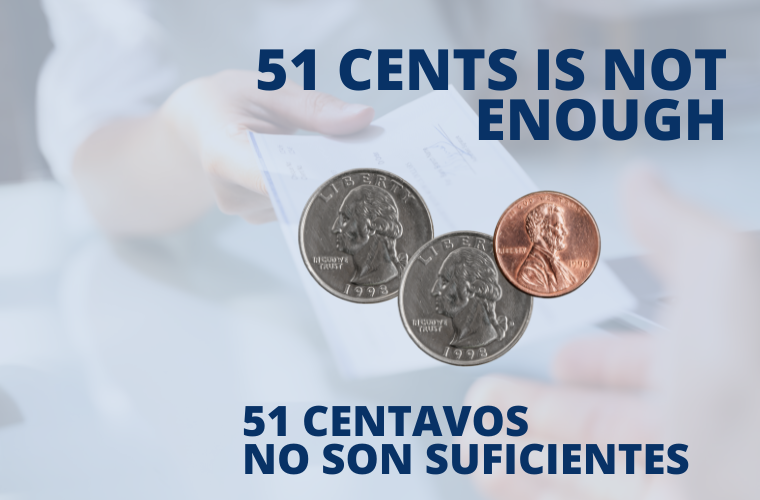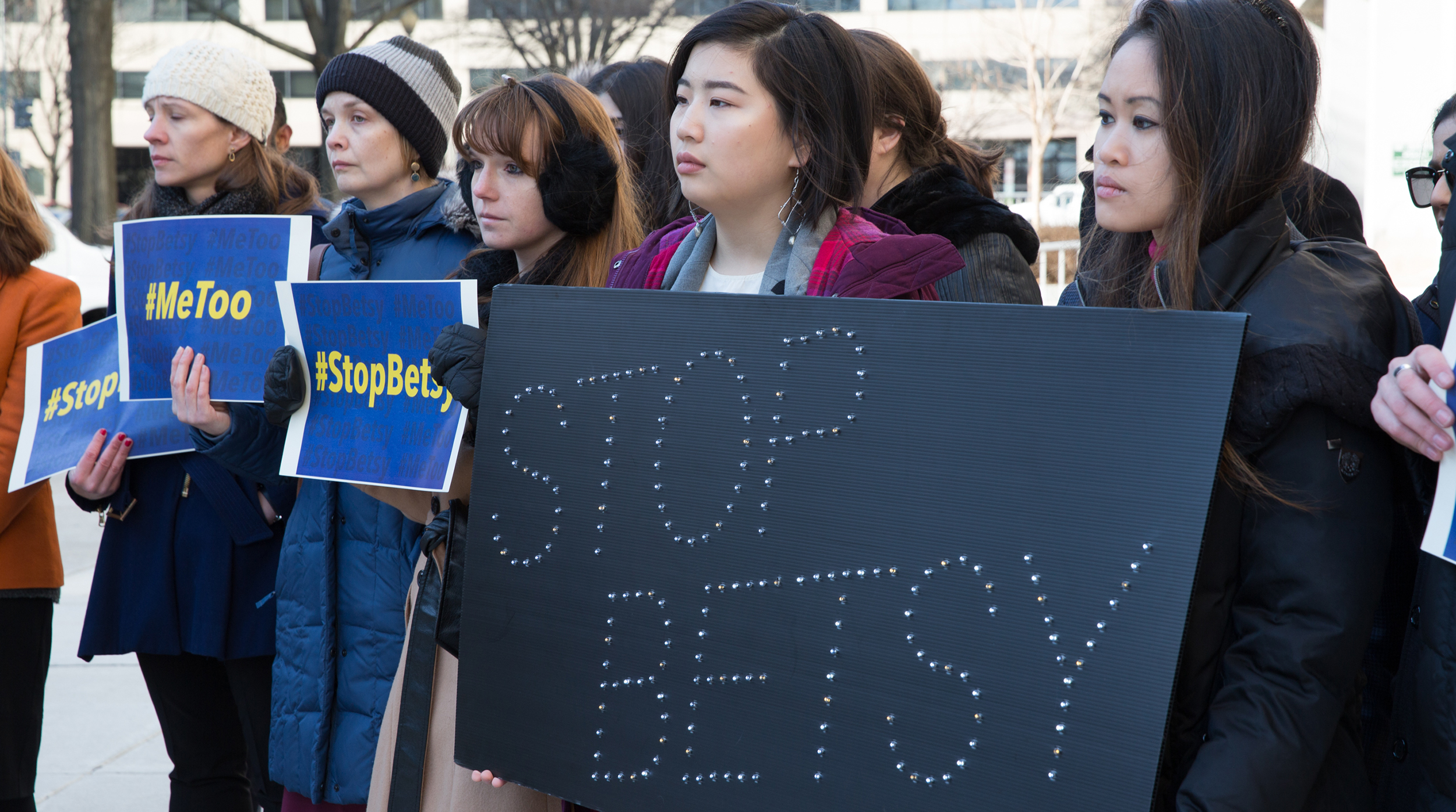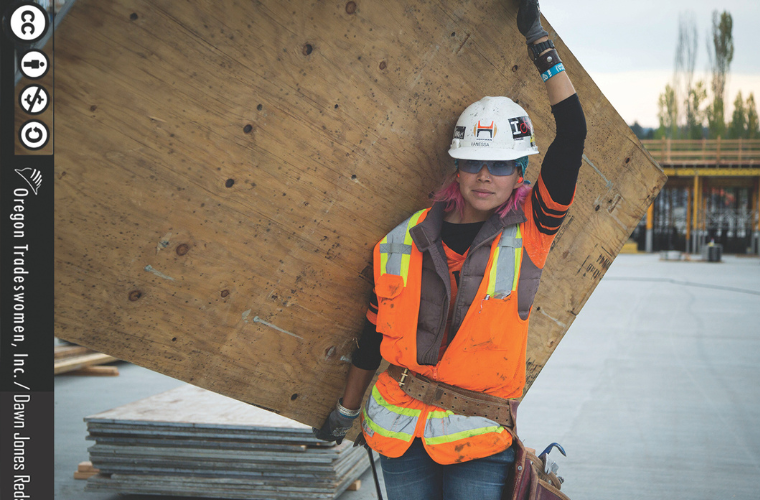

Survivors fight back: 5 ERA student clients join our DeVos lawsuit
Five ERA clients who survived sexual assault or harassment as students have joined our lawsuit against the U.S. Department of Education and Secretary Betsy DeVos over new federal Title IX rules that are set to take effect August 1. The disastrous new rules will harm students nationwide, from grade school through graduate school, making it harder for them to report incidents and seek safety after experiencing sexual violence at the hands of a fellow student, teacher, or school staff.
The five students and recent graduates who joined are lawsuit come from different schools, different backgrounds, and have had different experiences with Title IX after surviving sexual harm. But they all agree that DeVos’s new regulations will make their cases much more difficult and re-traumatizing, prompting most of them to even consider dropping their complaints—despite already having gone through so much of the Title IX process, and despite wanting so badly to protect themselves and other students from those who harmed them.
This is the Trump Administration’s desired effect. These new Title IX rules are intended to intimidate student survivors into silence, into not reporting sexual violence or dropping Title IX complaints once faced with the reality of a process that could re-traumatize them every step of the way.
The new rules won’t just harm survivors. A reporting freeze and reduced investigations into incidents of sexual violence put all students at risk, because a sexual predator who knows their victims will be too discouraged to come forward knows they can get away with sexual harassment and rape without consequence.
So these survivors are fighting back.
Here’s what they have to say about DeVos’s new Title IX rules. Read more about their individual stories below. (Survivors’ names have been changed for protection during the ongoing lawsuit. These are their words, but some sections have been lightly edited for brevity or clarity.)
Nancy Doe
- “I’ll never be the person I once was. I just want a Title IX investigation because it helps with the healing process. This happens so often to so many people. This isn’t a minor issue. Title IX isn’t just about sexual assault. It involves racism, and discriminaton against sexuality. Everyone should be worried about the new rules.”
- “Doing this [lawsuit] has been helpful because it feels like justice.”
Anne Doe
- “I don’t think these new rules are designed at all to hold anyone accountable for bad things they have done.”
- “The final rule made me feel like he mattered more than me, anyway, and that I didn’t really matter. So I think coming forward under the final [new] rules would just give him the tools he needed to make things much worse for me.”
Lisa Doe
- “With the new rules, so much of what I’m going through has been invalidated. It has made the process of finding closure and protecting myself from him so much more difficult.”
Sobia Doe
- “There is no way that a harmer like him would not seize every invitation that the new rules create to intimidate me and traumatize me out of my complaint.”
- “I would consider dropping my complaint because I will not subject myself to being in the same room with him and/or allowing his advocate to directly cross examine me.”
Susan Doe
- “The threat of harm to me and my witnesses of cross-examination would outweigh my ability to move forward with my Title IX complaint.”
- “The new rules would make conditions on campus for me even worse, and I would feel even more unwelcome and on guard every time I step on campus.”
Nancy Doe’s story
“Nancy Doe” is a bisexual Latinx woman who graduated from the University of New Haven in 2019. She had to file two Title IX complaints while in college: one because she was sexually assaulted as a freshman, and another because she was nonconsensually filmed while having sex as a junior, and the perpetrators then distributed the footage around campus without her consent.
“In both 2016 and 2018, the school’s Title IX office completely invalidated my experience when they refused to take action. I have felt insane for caring so much when no one else seems to. The fear I felt was made worse by the fact that I didn’t trust my school to protect me.
I received a formal PTSD diagnosis in August 2019. It felt like my school had taken my life away from me. I wish the school had done something, anything, to hold those students accountable for their actions.”
On DeVos’ new Title IX rules
“The new rules are making me consider dropping my Title IX case. I get anxious about it. I made all this progress and then I would feel dragged back to 2018. It would feel invalidating, like I shouldn’t open my mouth.
I feel like the new rules give victims fewer rights and protections. Why would I go through with it just to have my rights stripped away? If the new rules came into effect, it would feel like a ‘screw you.’ It would feel like I was punished for having this done to me.”
- The new rule banning investigations of off-campus incidents (outside school programs/activities): “I’m worried that the school won’t have to investigate the student who is still enrolled because the video was made off campus.”
- The new rule requiring all no-contact orders to be mutual no-contact orders: “I didn’t get a no-contact order because there was a mutuality requirement. Another girl who came forward had a mutual no-contact [order] and the school limited her schedule and then blamed her for any violations.”
- The new rule requiring live cross-examination: “If the case does move forward, I’m worried about having to go to a hearing that includes cross examination conducted by advisors, especially if the respondent gets a lawyer. Every time I think about it, I get anxious and start cross examining myself in my head. I always feel like I have to think 5 steps ahead when I say something: How could this be misconstrued or used against me? [The] other party or advisor could come at me full force…and drag me through the mud.”
Lisa Doe’s story
“Lisa Doe” is a Chinese American woman who just finished her freshman year at University of California Irvine. She was sexually assaulted in March 2020 at an off-campus apartment by a student who is in the same cultural student club as her.
“I was worried about my safety when we returned to campus and the safety of other members of our club, so I reached out to one of the club leaders. They told me there was nothing they could do to keep him out of the club unless there was a formal investigation by the school.”
On DeVos’s new rules
“With the new rules, so much of what I’m going through has been invalidated. It has made the process of finding closure and protecting myself from him so much more difficult. The new rules are unnecessary and don’t help people address problems on the school level.”
- The new off-campus restriction: “I don’t know if my assault will be investigated under the new Title IX rules because it happened off campus. I asked [my school], and they told me they are still waiting on guidance about how the rule change will affect them.”
- The new rule eliminating investigation deadlines: “I’m worried that the Respondent will try to extend the process so he graduates before it’s over and he avoids accountability.”
- The cross-examination requirement: “I’m also worried about having to go to a hearing, let alone one with live direct cross examination through advisors. Cross examination…minimizes what happened. I’m worried about being harassed at a hearing. Being near him makes me uncomfortable or having to see him, hear him. I’m especially worried about the hearing happening over Zoom due to COVID. I’m at my parents’ home and only have privacy when they are at work, and I’m concerned the hearing would happen while they are in the house.”
Why she’s fighting back
“The assault and my uncertainty about how to proceed has affected my mental health, and it affected my grades in both winter and spring quarter…This undermined my focus on classes and finals for the rest of the year.
I’m scared about interacting with our shared cultural club or going to events when we’re back on campus. I’m also worried that he and his friends will retaliate against me if I move forward with the investigation. I am thinking about seeing a counselor because I cry every time I have to talk about this.”
Anne Doe’s story
After she was sexually assaulted by a fellow student of U.C. Santa Barbara, “Anne Doe” tried to look into options of who she should report the incident to, and how. The information was not easy to find.
“My school did not have anything on its website [that I could find] about Title IX when I looked. Then I found a news article about changes happening to the Title IX rules. I remember reading about the changes made me feel very angry. What the article was saying about the new rules made me feel hopeless. I remember thinking ‘oh, now really nothing will happen to hold my rapist accountable,’ and that if I reported, I would just be invalidated.
The more I understood the new rules, the more it really solidified for me that there was no way I could get what I really wanted and needed for me from a reporting process. I don’t want or need to hurt him just to hurt him. I want him to be held accountable because what he did was so wrong and so violent and hurt me so much. But I don’t think these new rules are designed at all to hold anyone accountable for bad things they have done. I think I would be doubted and harassed by the process itself just for reporting…I can’t afford to risk my recovery and my ability to process what happened to me in a system I can’t trust and that wasn’t designed to protect me or believe me.
The final [new] rules made me feel like he mattered more than me, anyway, and that I didn’t really matter. So I think coming forward under the final rule would just give him the tools he needed to call me a liar and make things much worse for me.”
On DeVos’s new rules
- The new off-campus restriction: “I also remember that the article [I read about the new rules] wrote about if things happened to you off campus, then it was like it didn’t happen under Title IX. I lived in the surrounding community around UCSB for three out of the four years that I was at UCSB, as most students do. Almost everything that happens to us happens off campus.”
- The new cross-examination requirement: “I am already fairly certain that I will not bring a Title IX complaint at this time. I never want to see him again, and I know if I did bring a claim under the new rules that he would have a right to [have a person of his choosing] cross-examine me.”
- The new requirement that Title IX parties must be current students: “I know that under the new rules, the school may be forced to not even consider my complaint because I am no longer a student. However, if the new rules do not go into effect and the above conditions occur, I am very inclined to do what I can to protect other students and come forward to my school.”
Sobia Doe’s story
Sobia was repeatedly sexually harassed and abused by their professor, who was instrumental to their success as a graduate student. As with many graduate students, they worked with this advisor one-on-one, did not know who could help when he started abusing them. Sobia knew that if they reported him, the professor would retaliate against them academically, threatening the career and reputation they’d worked so hard to build for so many years.
Sobia also believes their professor targeted them because of their identity as a nonbinary Muslim woman, and the stigma that might come with telling others in their community about the sexual abuse.
“He is a masterful manipulator. I believe there is no way that a harmer like him would not seize every invitation that the new rules create to intimidate me and traumatize me out of my complaint against him by fully utilizing a process that is not designed to protect me from him but seems instead to be designed to protect him against consequences of what he did to me.
I truly believe I may have something along the lines of a break down if I had to re-do any of the investigation or adjudication that has been completed to date if the new rules go into effect or if the school was to continue the next steps of my Title IX complaint under the new rules.”
On DeVos’s new rules
“I feel like the old Title IX regulations did not weigh in favor of complainants and the scales certainly were not tipped in favor of survivors. Students already didn’t have the protections they needed, and the new rules go in the wrong direction. These rules make it even harder for survivors to come forward.
Schools are supposed to be protecting all of their students from perpetrators, not protecting perpetrators’ access to their students. These new rules and the negative effect they will have on survivors coming forward can only make it harder for schools to protect their students.”
- The new cross-examination requirement: “There would be the possibility of me being cross-examined in a live hearing. I don’t think I would want to be involved with my alma mater if they made me do that. I am sure that it would make me not want to comply further with the investigation.
- I am afraid that if the final rule goes into effect, he will challenge the school’s prior investigation and seek application of the final rule. I don’t think that he would assume that I would be able to face him in a live hearing, and it is clear that my inability to do that would be to his great benefit under the new rules.
- I would consider dropping my complaint because I will not subject myself to being in the same room with him and/or allowing his advocate to directly cross examine me. I know that being cross examined would cause panic attacks and anxiety attacks. The prospect of undergoing that would be very traumatizing, and it would be unwise and unhealthy for me to allow myself to be subjected to those conditions given the harm that I have already suffered by this Professor.”
Susan Doe’s story
Before filing a Title IX complaint with her school, Susan sought a restraining order against the fellow student who sexually harmed her. The experience of facing her harmer and his family in court has made her very wary of the new Title IX rule requiring live cross-examination of survivors and witnesses.
On DeVos’s new rules
- The new cross-examination requirement: “I would consider dropping my Title IX complaint if the new rules went into effect…I know the trauma of being cross-examined in a live setting, and I saw the negative and stressful effects such cross-examination had on my witnesses. I would not and could not put myself or my witnesses through that again, even though it is important to me to seek protection and redress from my school. The threat of harm to me and my witnesses of cross-examination would outweigh my ability to move forward with my Title IX complaint.”
- The new off-campus restriction: “Given the timing of my complaint and when the new rules are scheduled to go into effect, I have reason to believe that one of the considerations weighing on the Title IX office right now in analyzing whether or not to move forward with an investigation in my matter is whether or not they have to apply the new rules, which would require them to dismiss my complaint because it happened off campus.”
- The new elimination of deadlines: “Additionally, the fact that there would no longer be a deadline on when the school would have to finish the investigation under the new rules would force me to consider dropping my Title IX complaint. The whole point of reporting and seeking protection and redress is so that I can move forward and be safe at school after what happened to me. Going through a prolonged or indefinite Title IX process is the opposite of that goal. It is the opposite of healing, and it would be dragging me through continued trauma and interaction with him in a process that is not created to meet the reasons I reported in the first place.”
- The mutual no-contact order requirement: “I would have to become even more hyper-vigilant than I already am because I would know that he had access to the campus and the buildings I am in for my campus employment, and I would have no idea when he was on campus or wasn’t, or even if he was still enrolled. The mutual no-contact order is already an opportunity for him to retaliate against me by filing a complaint against me if I run into him. The new rules would make these conditions on campus for me even worse and I would feel even more unwelcome and on guard every time I step on campus.”
Why she’s fighting back
“I am starting to feel like I am finally arriving at a stable place after what he did to me. Moving forward with another investigation with him is already a risk I am taking to the progress I’ve made in my health, but I am moving forward because I want protection from my school, and I want other students to be protected from the harm that I am fully convinced he is capable of doing to others.”
“I believe I would have to drop my Title IX complaint if I had to undergo a Title IX investigation/adjudication under the Final Rule, not only because of the personal emotional trauma the new rules promise through their live-hearing and live cross-examination requirements, as well as other requirements weighted against complainants, but also because I simply cannot afford the impact going through such a process could have on my education. I already had to withdraw, go part-time, drop and then retake difficult classes because of my harmer and his presence on campus. I absolutely cannot afford to drop any more classes or take any more time off of school.
I believe that trying to move forward under the new rules, or learning that my matter was dropped by my school because of the new rules…threatens to eliminate all the mental health progress I have made.”
Stay Connected & Take Action
- Get the Latest News & Information Sign up for Email Updates
- Sign Up for Action Alerts Join the Action Team
- Follow Us


